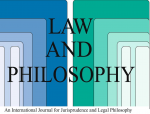The overall conclusion is that any institution or practice—human trafficking is a modern case in point—that, in effect, treats a person as a non-person, as only a means instead of as an end-in-themselves, violates their inalienable rights and is illegitimate, even with consent.
On Property Theory
This paper is an introduction to property theory including the invisible hand mechanism which handles the initiation and termination of property rights in an on-going private property market economy. The Fundamental Theorem is that when Hume’s conditions of no involuntary transfers and no breached contracts are fulfilled, then the Lockean principle of people getting the fruits of their labor, i.e., imputing legal responsibility in accordance with de facto responsibility is satisfied. The major application is to the current system of a private property market economy based on the renting of persons, i.e., the employment contract.
This is a reprint of the paper in the Journal of Economic Issues in Sept. 2014.
Property and Contract in Economics: The Case for Economic Democracy
This book presents a modern version of the old Labor (or Natural Rights) Theory of Property and of an Inalienable Rights Theory that descends from the Reformation and Enlightenment. Together these theories re-solve the basic problem of distribution in the sense of giving a basis for the just appropriation of property and a basis for answering the question of who is to be the firm, e.g., the suppliers of share capital as in conventional capital, the government as in socialism, or the people who work in the firm as in the system of economic democracy (or labor-managed market economies).
Inalienable Rights: A Litmus Test for Liberal Theories of Justice
This paper published in the European journal, Law and Philosophy, examines the intellectual history of inalienable rights theory, and critically examines the work of liberal philosophers of justice, John Rawls and Robert Nozick, from that perspective.
Listen Libertarians! Concluding Part V
In this fifth and concluding part of the review of John Tomasi’s book Free Market Fairness, we look at the invisible hand mechanism of the property system (in contrast to the usual price system) which seems to be invisible to liberal scholars and social scientists since it does not give a satisfactory “account” of the current economic system based on the renting of human beings.
Listen Libertarians! Part IV
In this Part IV, we consider the rather fake “inalienable rights” theory of classical liberal/libertarian thought that is consistent with a civilized voluntary slavery contract, a nondemocratic pact of subjection, and a coverture marriage contract, all of which are outlawed in the advanced democracies.
Why was Slavery Wrong? Involuntariness or Treating Persons as Things?
“Involuntariness” is the usual answer.
Indeed, classical liberalism takes the most basic framing of a social question as: “consent or coercion?” In this view, democracy is characterized as government “with the consent of the governed” so slavery and non-democratic government were both condemned for the lack of consent.
This common condemnation of slavery on the basis of involuntariness has caused a large amount of intellectual history to just go “down the memory hole.” Those who routinely condemn involuntary slavery have either forgotten or never knew that from Antiquity down almost to the present there have always been those pro-slavery writers who: (1) presented a defense of slavery based on consent or contract, and (2) interpreted much of historical slavery as being based on implicit or explicit contracts.
My focus here is not on (2), the empirical question of whether or not any historical slavery could be interpreted as being voluntary, but (1), the fact of intellectual history that so many classical authorities defended slavery if based on consent.

